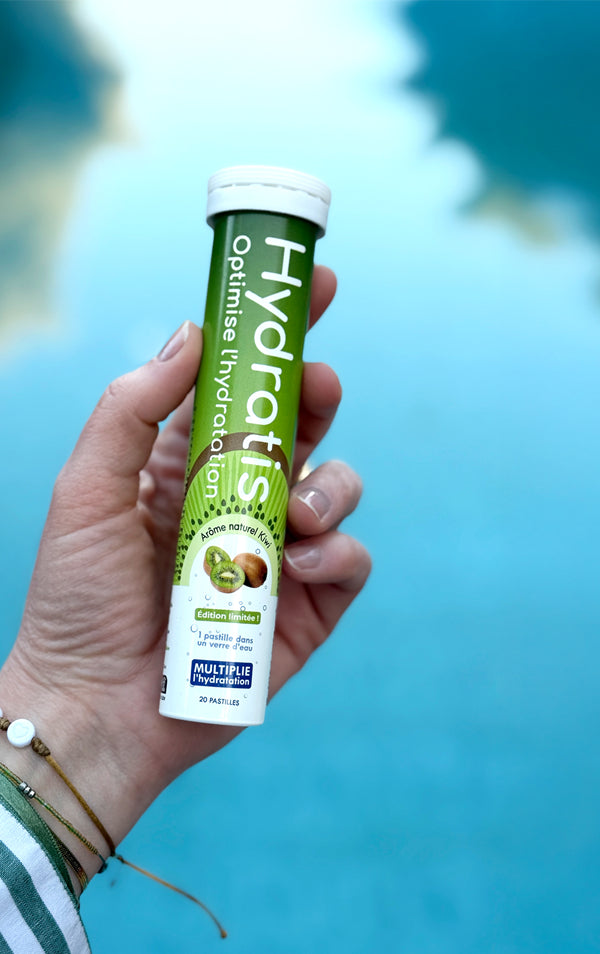You may already be noticing it: a slight forgetfulness, a mental fog that sets in after prolonged exertion, or that feeling of fatigue that hits you as soon as the temperature rises. Often, the cause is simpler than it seems: your body is dehydrated . Beyond physical comfort, proper hydration is essential for your cognitive health, your mood, and your overall performance. Let's explore together the effects of even mild dehydration on the brain , the warning signs, and strategies for keeping your mind sharp.
Why is water essential for proper brain function?
The human brain is a predominantly aqueous organ: approximately 75 to 80% of brain tissue is made up of water . This high water content ensures the rapid delivery of nutrients by the blood and maintains the electrical conductivity essential for neuronal functions.
Hydration supports several vital mechanisms:
- Nutrient circulation and oxygenation. Good hydration ensures adequate blood flow to continuously oxygenate your nerve cells.
- Neuronal connection and plasticity. Water promotes the production of neurotransmitters and synaptic plasticity, essential for your memory and learning ability.
- Thermoregulation. During intense activity or exposure to heat, the central nervous system depends on effective sweating, and therefore on a sufficient supply of fluids.
When your body experiences fluid loss , the balance of electrolytes like sodium and potassium becomes disrupted. The conduction of nerve impulses slows down, affecting the efficiency of neuronal communication . As a result, your cognitive abilities decline.
What are the consequences of poor hydration on the brain?
According to several studies, losing only 1 to 2% of your body water is enough to reduce your cognitive performance (concentration, attention and speed of information processing).
In other words, your brain can slow down even before you feel thirsty. This makes it difficult to stay focused, remember recent information, or perform certain tasks.
The effects of dehydration on the brain also include:
Mood disorders. When blood osmolarity When fluid levels increase due to dehydration , nerve cells are subjected to osmotic stress. This imbalance disrupts the transmission of chemical signals and leads to impaired neurotransmitter function . Mood swings can appear rapidly: irritability, anxiety, and emotional lability.
Headaches. A dehydration deficiency causes vasoconstriction, that is, a narrowing of the blood vessels. This reaction reduces cerebral perfusion and therefore the supply of oxygen and nutrients to nerve cells. This Lack of blood flow triggers headaches , often accompanied by symptoms of tension.

Early fatigue. In case of water deficit, ATP production — the main energy molecule in cells — decreases. This energy slowdown directly impacts muscular endurance, but also cognitive abilities. Your body tires more quickly and your mind loses sharpness.
What are the effects of dehydration on mental health?
Imagine a circular diagram where each quarter illustrates an impacted area: memory – concentration – mood – alertness. The more dehydration progresses, the more each segment becomes gray.
The effects of dehydration on the brain extend beyond cognitive impairment. Significant dehydration can also disrupt your emotional balance and increase feelings of mental fatigue.
When the body detects a fluid deficit, an increase in cortisol production occurs. This hormone, in excess, amplifies stress, anxiety, and irritability.
According to a study published in Nutrients , insufficient water intake accentuates the signs of mild depression, particularly in women and children.
Cerebral dehydration: signs to watch for
The warning signs are not always obvious: persistent headaches, brain fog, decreased concentration, sleep disorders, dry skin...
The simplest indicator is the color and volume of your urine . If you notice dark and scanty urine , this indicates insufficient hydration.
If these symptoms are accompanied by cramps, vomiting, or dizziness, you may have lost too many electrolytes. In this case, emergency rehydration , or even medical advice, is necessary, especially if you suffer from one of these chronic illnesses (diabetes, kidney failure, etc. ).
Hydration as a tool for mental health prevention
Maintaining a good level of water in the body helps you to:
- Reduce the risk of depression and mental exhaustion by stabilizing neurotransmitter production;
- Improve sleep, attention and mood through the secretion of melatonin and serotonin;
- Limiting the consequences of decision fatigue, a real obstacle to professional performance.
In short, your water bottle is a substitute for preventative treatment. Regular hydration mitigates the effects of daily stress and strengthens your cognitive resilience.
Simple tips to keep your brain well hydrated
The standard recommendation is 30-35 ml per kilogram of body weight; that is, 2 to 2.5 liters for an average adult (including water from food). It is known that the water provided by food accounts for approximately 20% of this amount, or between 1.6 and 2 liters. This intake varies with age, temperature, physical activity, and hormonal status.

Tips to remember to drink:
- Split your consumption: a large glass upon waking, one before each meal, one after each screen break.
- Vary your sources: still water, warm infusions, foods rich in water (cucumber, watermelon, soup … ).
- Use a tracking app or set reminders to establish a routine. Hydration and coffee, alcohol, screens: what you need to know
Caffeine and ethanol increase urine production. Compensate for each cup of coffee or glass of alcohol with an additional 250 ml of water. Prolonged screen time can disrupt your circadian rhythm and cause dry eyes. Hydrate before, during, and after your sessions.
How Hydratis can support you in your routine
Hydratis offers tablets free of colorings and preservatives, which add electrolytes (sodium, potassium, magnesium ), glucose, and trace elements (zinc and manganese) to your drink. This formula optimizes water retention and accelerates the delivery of nutrients to brain tissue. They are particularly useful and effective in any situation that leads to water loss (heat waves, exertion, illness). Keep them on hand to support your energy and cognitive function.
Conclusion: the brain also gets thirsty
The sensation of dry mouth shouldn't be ignored. It's the first sign of a fluid imbalance which, if it persists, will slow your mental capacity even before your body sends other signals. Drink regularly, monitor your urine, adjust your intake: your brain will thank you!






